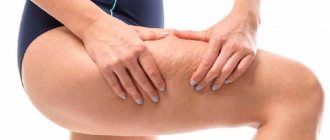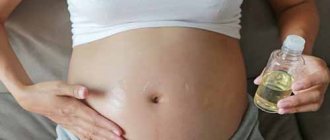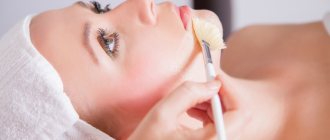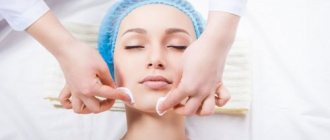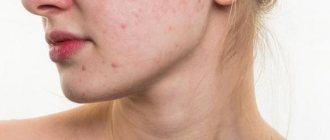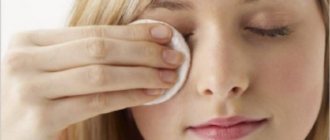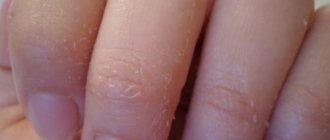Skin during pregnancy can present many surprises. This is due to hormonal changes in the body for a successful pregnancy.
During pregnancy, many pleasant surprises and events await future parents. They will see their baby on the screen for the first time, feel the first movement, and how many events will be associated with the preparation for the arrival of the long-awaited baby. But for the expectant mother, the skin can prepare its own surprises.
In the body of a pregnant woman, hormones simply rage and thus this affects the condition of the skin. The skin can become firm and elastic, or dry and rashy.
Unpleasant pimples
As soon as a woman finds out that she will soon become a mother, nasty pimples begin to appear on her face. If before pregnancy a woman was often sprinkled during menstruation, then during pregnancy the same will most likely happen to her.
This occurs due to the fact that the hormonal balance is disturbed; the hormone progesterone begins to be produced in large quantities.
In order to improve the condition of your skin, you need to drink as much water as possible and adjust your diet. Proper nutrition will not only benefit the expectant mother, but also the benefit of the baby.
During pregnancy, the skin should be cleansed with a mild toner. It is better to use creams as rarely as possible, as they clog pores. If a woman decides to consult a cosmetologist or dermatologist, then it is necessary to warn her about her situation in order to avoid procedures or taking medications that could harm the baby.
If the cause of pimples is related to hormonal imbalance, then they will go away after the baby is born. If they do not go away, then consultation with a specialist is necessary.
How to choose a bra during pregnancy
Doctors believe that there is no urgent need to use specialized underwear for pregnant women. The main thing is that it does not squeeze the chest.
Breasts grow in the 1st and 2nd trimesters, only reaching the size that will remain during the feeding period by the 3rd. You can choose the same bras for pregnant and nursing women and immediately buy bras that need to be partially unfastened for breastfeeding. When choosing a bra, it is important to pay attention to the fabric composition: cotton and lycra are preferable. Such underwear stretches if necessary, without causing discomfort. The straps should be wide and the cups should cover the entire chest
There is no need to choose bras with underwires: they can move and pinch the duct during breastfeeding. From the second trimester, colostrum may be released from the nipples - use special bra inserts. How many bras should you buy? As a rule, women during pregnancy and lactation need three special bras.
Dry skin during pregnancy
If the expectant mother feels that during the day the skin is tight, itchy, flaky and red spots appear on it, then the skin is very dry.
This occurs due to the production of estrogen, which helps reduce the activity of the sebaceous glands.
In order not to injure or dry out the skin, it is necessary to wash your face without soap and not to use toners that contain alcohol. To moisturize, use special products (creams, milk, cream). It is best if their composition is natural.
After the baby is born, the levels of estrogen and progesterone will begin to return to normal and the sebaceous glands will begin to work correctly.
Also, itching can occur due to the fact that bile stagnation has occurred in the body of a pregnant woman. In medicine this is called intrahepatic cholestasis of pregnancy. During pregnancy, there is a heavy load on the liver, and bile salts increase in the blood. This can cause severe itching.
If a woman is bothered by itching, then she should consult her doctor so that he can refer her for tests and an ultrasound. Cholestasis can be dangerous for both mother and baby.
After childbirth, the load on the liver decreases and everything goes away within the first month.
What cosmetics are harmful for pregnant women?
Decorative cosmetics, as a rule, do not contain ingredients harmful to pregnant women. On the contrary, experimenting with makeup is a wonderful opportunity for pregnant women to take care of themselves and be positive.
With “care” products everything is different. Dermatologists recommend that during pregnancy you be attentive to what ingredients are in the creams, tonics and other cosmetics that a woman applies to her skin. The fact is that many substances can penetrate the skin and enter the bloodstream, which can potentially harm the child.
Here is a list of ingredients that are considered unsafe for pregnant women.
- Retinoids. They are usually added to anti-aging cosmetics. These are vitamins of group A, which accelerate the renewal of skin cells and prevent the breakdown of collagen, but they can harm the unborn baby if taken orally. Although there is no official data on the dangers of retinoids when used externally, doctors still recommend refraining from using cosmetics with this ingredient while expecting a child.
- Salicylic acid and BHA, one of its forms. It is used in a large number of cosmetics and is intended to treat acne. It also harms the unborn baby, primarily when taken orally. Doctors do not object to the external use of salicylic acid in creams or tonics - if its concentration does not exceed 2%. But if this additive is in scrubs and peels, salicylic acid penetrates deeper into the skin, and this is already considered unsafe for the baby.
- Soy. Products made from it are useful for pregnant women when added to the diet. How is soy harmful when used externally? Cosmetics based on this ingredient make age spots darker thanks to the phytoestrogens contained in soy. By the way, bergamot oil has the same effect.
Stretch marks
Almost 90% of women develop stretch marks during pregnancy.
This happens because the expectant mother gains weight too quickly, her stomach enlarges and her skin is not able to quickly adapt to what is happening. The dermis (layer of skin) begins to tear, which is why stretch marks occur. At first they have a red tint, which gradually becomes whiter.
In order to avoid stretch marks, you need to use special stretch mark creams. To prevent the skin from losing its elasticity, it is necessary to maintain water balance and drink as much water as possible.
If a woman has stretch marks and they are very noticeable, then you can consult a doctor. He can prescribe products that will make stretch marks less noticeable.
Liquid vitamin E helps very well against the appearance of stretch marks. It nourishes the skin well and makes it more elastic.
Eczema in pregnant women
Unfortunately, this trouble very often appears after the first trimester. Eczema in pregnant women is very difficult to treat.
- The first thing to do at the first signs of eczema is to avoid contact with any substances that can cause itching (perfumes, household chemicals, strong-smelling cosmetics, etc.)
- Antihistamines and topical steroids can help relieve eczema, but you should consult your doctor before using them.
- Take a shower often, but be careful with the duration of the procedures - prolonged contact with hard water can lead to dryness and irritation.
- Remember that the main catalyst for the occurrence of eczema is stress. Stay calm.
- If itching occurs, apply ice, but do not scratch the irritated area - this is almost guaranteed to lead to infection. Keep your nails short and shaped so they don't scratch your skin on contact.
The appearance of excess hair
Many mothers start to get scared when excess hair begins to appear on their body.
This occurs due to the production of male hormones, which are associated with disruption of the ovaries and adrenal glands. Excess hair may appear on the face and chest. Hair, which was barely noticeable before pregnancy, will begin to grow under the influence of male hormones and become coarser. In addition to hair, exposure to male hormones can cause acne (acne)
It is forbidden to use depilatory creams because they can harm the baby. If the hair gets in the way too much, it is best to get rid of it mechanically. If you have excessive hair growth, it is best to consult an endocrinologist.
The woman's condition returns to normal approximately six months after childbirth.
Spots on the face during pregnancy: cause and treatment
A common problem that upsets women during the second trimester is the occurrence of chloasma. It manifests itself as pigment spots on the nose, forehead or cheeks.
Spots on the face during pregnancy appear as a result of hormonal changes in the body. The decisive role here is played by changes in the amount of melanin pigment. It is responsible for the color of skin and hair and protects the skin from the harmful effects of ultraviolet radiation. During pregnancy, the secretion of melanocyte-stimulating hormone by the adrenal glands increases. As a result, melanin is released in large quantities, which leads to hyperpigmentation. This is the reason for the appearance of spots on the face. Sun rays can also stimulate their occurrence, so women are advised not to overexpose themselves to the sun and use hypoallergenic sunscreen.
Doctors do not advise radically dealing with age spots on the face during pregnancy. It will not be possible to remove them before the baby is born, but you can make them less noticeable using traditional methods.
Folk remedies against age spots on the face:
- Lotions with fresh yogurt or lemon juice and honey (2 tbsp.). The lotion is applied with gauze for 20 minutes;
- Masks with fresh cucumber or parsley pulp are applied to the age spot for 20-30 minutes, and then washed off with water.
Heat rash and diaper rash
Miliaria and diaper rash can occur in a pregnant woman. Because during pregnancy the body’s work increases, including the sweat glands actively working.
Miliaria occurs due to clogged pores. In order to cope with it, it is necessary to empty the pores and cool the skin as often as possible. A pregnant woman's everyday clothes should be made of natural cotton fabrics, especially underwear. For areas of the skin where prickly heat occurs, it is necessary to arrange air baths as often as possible. The use of fatty creams is prohibited; they clog the pores very much.
Diaper rash most often occurs where the skin touches each other. It is necessary to monitor the hygiene of problem areas as carefully as possible and, after drying, treat the areas with powder or talcum powder.
In summer, the problem may worsen due to heat
Miliaria and diaper rash usually occur in the third trimester of pregnancy and begin to subside immediately after childbirth.
If there is any discomfort on the skin, it is worth discussing it with your doctor so that he can help you sort out the problem and prescribe the correct treatment. Then pregnancy will be easy and beautiful.
A set of facial care measures
We have examined the unpleasant manifestations that a pregnant woman encounters. To prevent them from poisoning your life for the entire nine months, you need to use a comprehensive approach to facial care during pregnancy.
First of all, you need to take care of your diet. It is necessary to limit the consumption of salt, spices, and foods rich in bad cholesterol. They lead to slagging in the body and disruption of the water-salt balance. It is better to eat more fresh vegetables, fruits, berries, dairy products, lean meats, and purified water. There is no need to overeat, it is better to eat more often and in small portions. You should not overeat at night; your last meal should be 4 hours before bedtime. Take a complex of vitamins after consulting your doctor.
The second important stage in care is creams and massage. Moisturize and nourish the skin with cosmetics that contain elastin, vitamins B, D and E. Do acupressure for 5 minutes a day. It enhances the outflow of lymph and blood, increases the elasticity of the dermis:
- using the thumb and index finger, massage the point at the bottom of the chin in a circular motion, and then on the forehead;
- without much effort we squeeze the skin from the center of the face in the direction of the temporal hollows, repeat 2-3 times;
- Apply light pressure from the corners of the eyes to the earlobes.
Give your skin a chance to breathe. Facial skin care during pregnancy means properly selected cosmetics that will help localize the problem. Do not overload your face with identical ointments, applying one after another. Use a light moisturizer in the morning and a nourishing serum at night. It is necessary to cleanse the skin 2 times a week using scrubs and peels. Use cosmetic masks based on herbal ingredients every three days. Avoid direct exposure to the sun's rays by using creams with SPF protection.
When wondering how to care for facial skin during pregnancy, you need to understand that high-quality medicinal decorative cosmetics are best suited for the sensitive skin of the expectant mother. And in the summer, it is generally better to minimize the application of cosmetics.
Skin care around the eyes during pregnancy
The delicate skin around the eyes requires special attention during pregnancy. She constantly needs proper care, but for the expectant mother this issue is especially relevant. Physiological changes lead to the appearance of facial wrinkles and dry skin. To help keep your skin looking flawless, follow these simple guidelines when performing basic care steps:
- Cleansing. All kinds of tonics and lotions without alcohol will come to the rescue. At home, cream or rich sour cream will help clean the surface of keratinized particles.
- Recovery. Moisturizing and nourishing hypoallergenic cosmetic products: creams, gels, serums have regenerating properties. Choose a product with a light texture to allow your pores to breathe.
- Protection. To increase the epithelial barrier, use medications according to your skin type. They will saturate it with the missing nutrients, protect it from drying out and environmental influences: sun, wind, frost. Replace soap for washing with tonics so as not to deplete your skin.
Mask recipes for problem skin
Problem skin is quite difficult to hide. If skin imperfections can be hidden under clothes, then even several layers of foundation are unlikely to hide acne or pigmentation. In addition, the use of a large amount of cosmetics leads to clogging of the skin, as a result of which a pregnant woman may develop acne and other inflammatory rashes.
There is an opinion that taking care of your skin during pregnancy is a useless task. As practice shows, the more you take care of your skin, the better it looks. Using some face masks can give pregnant women a radiant and healthy look. Below are recipes for homemade cosmetics.
Take 100 grams of sour cream, add 1 egg yolk, finely chopped peel of 1 lemon, pour a small spoon of vegetable oil on top. Mix everything thoroughly. After this, apply the resulting mixture to your face using a brush, wait until it dries completely. After this, wash your face using parsley decoction.
If you have oily skin, then the following mask will definitely suit you. Take regular yogurt without filler, apply it to your face, wait until it dries completely, then wash with plain water. This mask can be used every day; it dries out oily skin and tightens pores.
If you want to refresh the skin on your face, then use a watermelon mask. Take a small amount of watermelon, turn the pulp into a paste, then apply it to your face for 20 minutes. As soon as the mask begins to dry out, rinse it off with warm water.
If you have dry skin, then you should try a mask with egg yolk. Take one egg yolk and mix it with a large spoon of vegetable oil. To enrich the skin with nutrients, add a small spoon of honey to the mixture. Apply the mask on your face for 20 minutes, then rinse it off with cold water.
Skin condition
Some women experience excessive growth of body hair, oily skin on the face and scalp, acne, mainly in the forehead, wings of the nose, shoulder blades, upper chest, which indicates a violation of the skin microflora and the function of the sebaceous glands .
During pregnancy, redness of the skin in the form of red spots (erythematosis of pregnancy), redness of the palms and feet, the appearance of pigmented spots, the development of atrophic scars in the abdomen and lumbar region (striae of pregnancy), and increased sweating are also possible. In other cases, on the contrary, women notice that their skin has become very dry and flaky, they are concerned about increased sensitivity of the skin and itching, sometimes painful, most pronounced on the arms, in the area of the anterior abdominal wall and mammary glands. The area of the face and hands especially peels.
All these conditions are associated with changes in the body's general hormonal background, the concentration of hormones and their ratio - androgens, progesterone, estrogens, prolactin, luteinizing and follicle-stimulating hormones, thyroid and adrenal hormones.
A particularly common phenomenon that causes significant discomfort and anxiety is itching, which occurs in 19-20% of all pregnant women. It is considered as a mild pain irritant of pain receptors. These stimuli are so weak that they are not identified by the nervous system. There are generalized (distributed throughout the body) and localized (for example, in the anus, vulvar itching) forms. Both may be due to various reasons.
Itchy feeling
The most common causes of itchy skin during pregnancy:
- Instability of the psycho-emotional sphere, neuropsychic disorders (psychogenic itching). In these cases, even ordinary minor irritants are perceived as itching. This especially happens in the evening and at night, at rest, when the cerebral cortex is not exposed to other significant stimuli. Itching occurs mainly along the inner surface of the arms and thighs, as well as in the armpits and groin areas.
- Use of synthetic underwear and woolen clothing, scented pads, alkaline antibacterial agents.
- Rapid increase in body weight, multiple births, leading to ruptures of connective tissue fibers and the formation of stretch marks, fluid retention in tissues. Most often, these causes lead to itching in the area of the mammary glands, abdomen, inner thighs, and lumbar region.
- Excessive sweating and insufficient adherence to hygienic measures for skin care.
- Development or worsening of existing diabetes mellitus, biliary dyskinesia, chronic cholecystitis. For example, an increase in the concentration of estrogen in the blood can contribute to stagnation of bile, which leads to excess levels of bile acids in the blood, causing itchy skin. An enlarged uterus and increased pressure in the abdominal cavity also disrupt the flow of bile from the liver and gallbladder into the duodenum.
- Changes in the balance of sex hormones, which can cause dry skin during pregnancy, leading to itching. The same reason can help slow down the synthesis of elastin and collagen fibers, which leads to impaired stretchability and elasticity of the skin, ruptures of connective tissue fibers with irritation of skin receptors, itching and the formation of stretch marks. Dry skin during pregnancy can also be a consequence of insufficient fluid intake, especially with excessive sweating, or be a symptom of hypothyroidism or latent diabetes.
- Iron deficiency, allergic reactions and intolerance to drugs taken independently or prescribed by doctors during pregnancy (vitamins, for example, folic acid, antibiotics and antibacterial agents, and even antihistamines, etc.), as well as foods that may not have been available before pregnancy cause no allergic reactions.
- Pregnancy provokes a more severe course of some latent autoimmune diseases. The most common such disease is dermatomyositis.
- Development or relapse of existing courses.
Development of dermatosis during pregnancy
Physiological itching, that is, caused only by normal hormonal changes in the body during pregnancy, is most often localized in the back, mammary glands, abdomen, palms and soles. It is very important to correctly carry out its differential diagnosis not only with that for various pathological conditions (diseases of the liver and kidneys, blood vessels, hematological pathology, HIV, reactions to beta-blockers and estrogens, general dermatoses, etc.), but also often with common specific dermatoses during pregnancy.
The most common and important pruriginous (itching) dermatoses during pregnancy include:
Pregnancy itch
It is observed in the first trimester and is not caused by cholestasis, that is, not associated with the pathology of the synthesis, secretion and release of bile or its constituent components into the small intestine. The cause has not been established. The influence of prostaglandins is assumed to lower the threshold of sensitivity to mild irritations. The sensations are generalized and are accompanied by an increased level of bile acids in the blood with normal liver function tests. This form does not pose a risk to the fetus.
Itching with cholestasis
It is also generalized, but is most pronounced in the area of the hands and feet. Significantly intensifies at night. Characteristic of the second and third trimesters and poses a threat to the fetus. The reason for its development is also unknown. A genetic predisposition is suspected, as well as changes in hepatocytes (liver cells) and in the biliary tract. Blood tests show elevated levels of cholesterol and lipids, bile acids, transaminases and alkaline phosphatase.
Polymorphic exanthema
Celebrated in the third trimester. It is localized mainly in the abdomen and proximal parts of the upper and lower extremities. Does not pose a danger to the fetus. The cause has not been established. It is often combined with increased body weight of the woman and fetus and rapid development.
Pemphigoid (vesical dermatosis)
Pruriginous folliculitis
Occurs from the 4th to the 9th months of pregnancy. Looks like itchy acne. The cause has not been precisely established, but it is believed that dermatosis does not pose a danger to the fetus and is caused by hormonal disorders. Folliculitis is localized mainly in the upper chest and limbs.
1. Pruritic dermatosis 2. Urticaria
